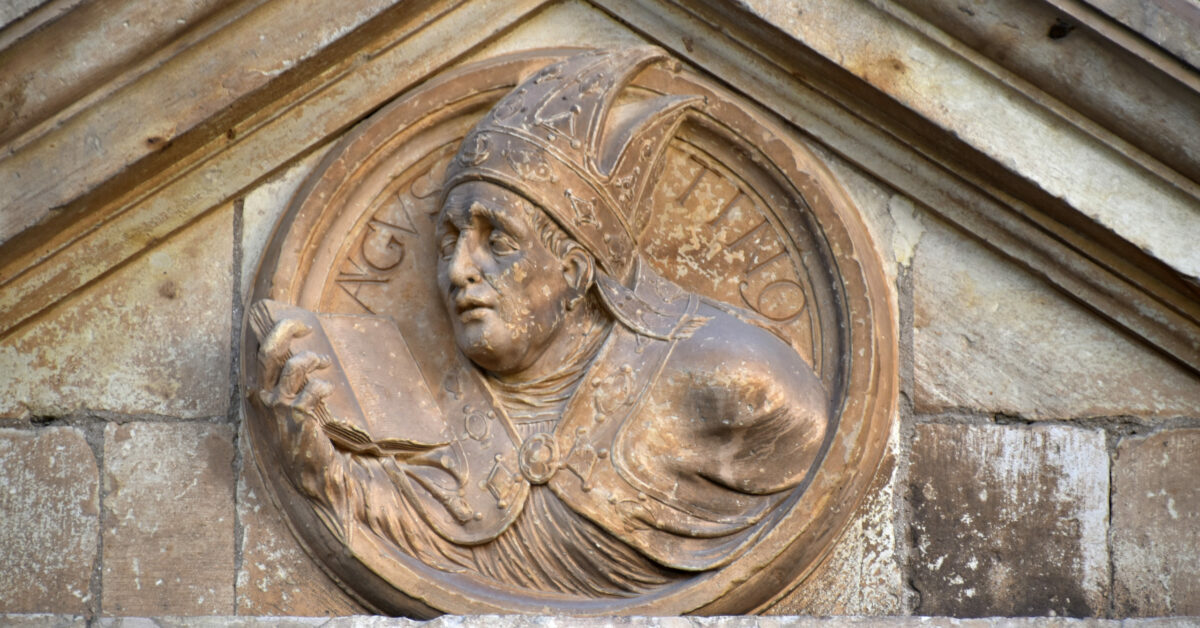On the Catechising of the Uninstructed: St. Augustine
Written at the request of a deacon from Carthage, Augustine “undertakes the task of teaching the art of catechizing …” in this treatise of thirty-some pages in the print edition (quotation from introduction of the Benedictine edition, quoted in the Schaff edition). As catechetical teaching resumes in parishes, whether for children, youth, or adults, some words of encouragement on the art of teaching from St. Augustine are appropriate. The prose is dense but the lessons worth the effort of a careful reading. My commentary (in italics) precedes each quotation.
I.1. Which teacher has not had such a moment as described here?
… At the same time, you have made the confession and complaint that it has often befallen you that in the course of a lengthened and languid address you have become profitless and distasteful even to yourself, not to speak of the learner whom you have been endeavoring to instruct by your utterance, and the other parties who have been present as hearers; …
II.4. Here Augustine outlines the subjects he will cover. Those who find pleasure in teaching will be attractive to learners. Cheerfulness is key.
…But as to the means by which all is to be done, so that every one may have pleasure in his work when he catechises (for the better he succeeds in this the more attractive will he be),—that is what requires the greatest consideration. And yet we have not far to seek for the precept which will rule in this sphere. For if, in the matter of carnal means, God loves a cheerful giver,1342 how much more so in that of the spiritual? But our security that this cheerfulness may be with us at the seasonable hour, is something dependent upon the mercy of Him who has given us such precepts. Therefore, in accordance with my understanding of what your own wish is, we shall discuss in the first place the subject of the method of narration, then that of the duty of delivering injunction and exhortation, and afterwards that of the attainment of the said cheerfulness, so far as God may furnish us with the ideas.
XI.17. Here he gives encouragement to those who feel less prepared or skilled at the art of teaching, reminding us to rest in God’s love and to pray for God to speak through us.
… If we ponder these things, and call upon the Lord to come into our heart, we shall be less apprehensive of the uncertain issues of our discourse, consequent on the uncertain feelings of our hearers; and the very endurance of vexations in the cause of a work of mercy will also be something pleasant to us, if we seek not our own glory in the same. For then is a work truly good, when the aim of the doer gets its impetus from charity,1406 and, as if returning to its own place, rests again in charity. Moreover, the reading which delights us, or any listening to an eloquence superior to our own, the effect of which is to make us inclined to set a greater value upon it than upon the discourse which we ourselves have to deliver, and so to lead us to speak with a reluctant or tedious utterance, will come upon us in a happier spirit, and will be found to be more enjoyable after labor. Then, too, with a stronger confidence shall we pray to God to speak to us as we wish, if we cheerfully submit to let Him speak by us as we are able. Thus is it brought about that all things come together for good to them that love God.1407
XIII.18 What shall we do “when we fail to see our hearer in any degree moved”? He offers advice for various situations (omitted here), ending with that of a person “of a very sluggish disposition.”
But in good truth it is a serious demand to make upon us, to continue discoursing on to the set limit when we fail to see our hearer in any degree moved; whether it be that, under the restraints of the awe of religion, he has not the boldness to signify his approval by voice or by any movement of his body, or that he is kept back by the modesty proper to man,1411 or that he does not understand our sayings, or that he counts them of no value. Since, then, this must be a matter of uncertainty to us, as we cannot discern his mind, it becomes our duty in our discourse to make trial of all things which may be of any avail in stirring him up and drawing him forth as it were from his place of concealment….
But if the man is of a very sluggish disposition, and if he is senseless, and without anything in common with all such sources of pleasure, then we must simply bear with him in a compassionate spirit; and, after briefly going over other points, we ought to impress upon him, in a manner calculated to inspire him with awe, the truths which are most indispensable on the subject of the unity of the Catholic Church,1412 on that of temptation, on that of a Christian conversation in view of the future judgment; and we ought rather to address ourselves to God for him than address much to him concerning God.
++++++++
Here is the link to the beginning of the treatise: https://ccel.org/ccel/schaff/npnf103/npnf103.iv.iii.html
Image from Wiki Commons:
Tondo on the first level of the Plateresque façade of the Colegio Mayor de San Ildefonso, in Alcalá de Henares, with a sculpture representing Saint Augustine. Inside the inscription AVGVS/TINVS. The work was carried out by the sculptor Claudio de Arciniega (c. 1527-1593).
https://commons.wikimedia.org/wiki/File:Tondo_con_representaci%C3%B3n_de_San_Agust%C3%ADn.jpg
